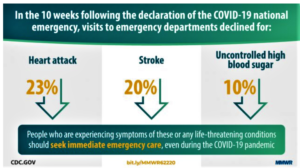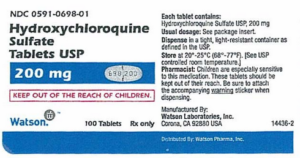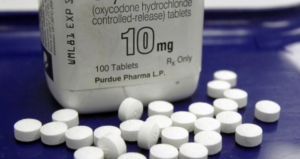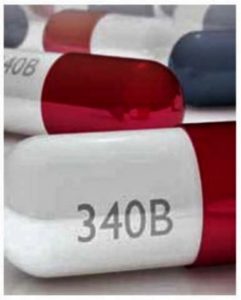- U.S. emergency visits due to heart attacks fell during early days of COVID-19 (reuters.com)Potential Indirect Effects of the COVID-19 Pandemic on Use of Emergency Departments for Acute Life-Threatening Conditions — United States, January–May 2020 (cdc.gov)
Fewer Americans were admitted to emergency departments with life-threatening conditions such as heart attacks during the initial months of the COVID-19 pandemic,..The study suggests that patients may be delaying or avoiding seeking care because of fear of COVID-19, researchers from the U.S. Centers for Disease Control and Prevention said...study...showed that the number of deaths in New York City from causes other than COVID-19 rose by more than 5,000 people above the seasonal norm during the first two months of the pandemic...Visits to the emergency department because of heart attacks fell 23%, ten weeks after the pandemic was declared a national emergency, compared with ten weeks before the emergency declaration...READ MORE
- Hydroxychloroquine takes another hit in failed small-scale COVID-19 study (fiercepharma.com)Outcomes of hydroxychloroquine usage in United States veterans hospitalized with Covid-19 (medrxiv.org)Hydroxychloroquine Derangement Syndrome (americanthinker.com)
Antimalarial hydroxychloroquine has raked in support as a potential wonder drug to treat COVID-19...But small-scale studies have been less than definitive on the drug's chances—and new data haven't cleared matters up much...Department of Veterans Affairs study found that severe COVID-19 patients treated with antimalarial hydroxychloroquine alone or in combination with antibiotic azithromycin showed "no evidence" of reduced risk of death or mechanical ventilation over supportive care, according to data...The researchers noted their analysis was not randomized nor controlled and cautioned patience for several ongoing clinical studies to read out before drawing conclusions on hydroxychloroquine's use for COVID-19...READ MORE
- Just a few hundred prescribers responsible for half of U.S. opioid doses (reuters.com)Opioid prescribing patterns among medical providers in the United States, 2003-17: retrospective, observational study (bmj.com)
The top 1% of opioid prescribers in the U.S. are responsible for 49% of all opioid doses and 27% of all prescriptions, according to a study that suggests efforts to combat overuse of prescription painkillers should concentrate on these heavy prescribers...“We did not know that opioid prescribing was so extraordinarily concentrated in the U.S., well beyond what we see for other medications,”...our study also showed that most U.S. physicians are now prescribing consistent with guidelines (Guidelines from the Centers for Disease Control and Prevention),” Humphreys said by email. “Taken together, these findings suggest that safer prescribing initiatives can be much more focused on the most prolific prescribers.”...READ MORE
- FDA approval may not be as rigorous as it once was (reuters.com)FDA Approval and Regulation of Pharmaceuticals, 1983-2018 (jamanetwork.com)Reform at the FDA—In Need of Reform (jamanetwork.com)
Changes in U.S. Food and Drug Administration procedures meant to speed approvals for medications may have resulted in less exacting standards, a new analysis suggests...Congressional acts that changed the way the FDA evaluates drugs have led to less rigorous evaluations, with drug approvals being based on fewer and/or earlier-stage clinical trials that may not be randomized, controlled, blinded or based on traditional measures of efficacy…the good news...points to the increased number of orphan drugs that have been approved...the bad news. “Faster in this case means that less data gets collected,”...“Some drugs may get accelerated approval, on thinner evidence, and wind up not being any better than existing and often cheaper alternatives.”...READ MORE
- OHSU’s COVID-19 Study Accused Of Racial Bias (opb.org)
Charges of racial bias in the design of an Oregon study of COVID-19’s spread are raising questions about whether it will do anything to help Black and Latino communities, which have been among those hardest hit by the pandemic...“All it will be able to say is if white people are fine. And then we open up counties and people of color will die,” said Andres Lopez, research director for the Coalition of Communities of Color, a Portland-based alliance of organizations representing a number of different communities of color...The Key to Oregon Study, which plans to enlist 100,000 Oregonians and monitor them for a year for COVID-19 symptoms, will include what its designers are calling “a focus on enrolling people who fully represent the state, including our diversity in geography, socioeconomic status and communities of color.”...critics doubt Key to Oregon will succeed in its goal. They say the study design is fundamentally flawed, and that those flaws could have been avoided if people of color had been brought to the table when the study was being created...READ MORE
-Responding with listening sessions
-Advocates say study design suppresses Black and Latino voices
-OHSU methodology overlooks lessons of the past
-The principle of ‘nothing about us without us’
-OHSU researchers respond - Studies Examine Association Between Opioid Prescriptions and Obesity (drugtopics.com)
In the first study...suggested that obesity contributed significantly to incident long-term prescription opioid use...Joint pain, back pain, injury, and muscle/nerve pain were identified as the highest contributors to the excess use observed among adults with obesity...The second study...looked at the pain conditions underlying this increased likelihood of opioid prescriptions for individuals with higher BMIs...the risk of receiving prescription opioids increased progressively with BMI... Addressing the opioid crisis will require attention to underlying sources of demand for prescription opioids, including obesity, through its associations with pain...READ MORE
- How influential are influencers? FDA plots study to measure power of Instagram celebs (fiercepharma.com)
...the FDA wants to know whether consumers care one way or the other about influencers' paid endorsements….The agency proposed two studies this week to look at four different kinds of influencers in advertising—celebrities, physicians, patients and online influencers. In the first study, participants will view print ads featuring a physician, a celebrity and a patient with either a full disclosure that the person was paid to appear or no disclosure at all...The second study will tap 698 followers of an Instagram influencer with more than half a million and ask them to view posts for a fictitious endometriosis product labeled directly as paid ads; labeled indirectly, such as with the common hashtag #sp for sponsored; or not labeled at all...The intent of both is to look at the “role of the endorsement and payment status on participants' recall, benefit and risk perceptions, and behavioral intentions,” according to the filing...READ MORE
- Show me the data: U.S. doctors skeptical of reported COVID breakthrough (reuters.com)
The report on...a powerful treatment for the new coronavirus brought skepticism along with optimism among U.S. doctors, who said the recent withdrawal of an influential COVID-19 study left them wanting to see more data...Global pressure to find a cure or vaccine has accelerated the process of reporting coronavirus study results, feeding confusion over whether therapies have been proven effective. One influential COVID study was withdrawn this month by respected British medical journal The Lancet over data concerns...Researchers in Britain said dexamethasone, used to fight inflammation in other diseases, reduced death rates of the most severely ill COVID-19 patients by around a third, and they would work to publish full details as soon as possible...But hours later South Korea’s top health official cautioned about the use of the drug for COVID-19 patients due to potential side effects...READ MORE
- University of Nevada, Reno School of Medicine report addresses statewide physician shortage, challenges and opportunities for growth (med.unr.edu)
A physician shortage continues to be a problem in Nevada and is hindering patient care access hardest in rural regions, according to a recent report focusing on health care workforce trends in the Silver State...According to the latest data published in the report, "Physician Workforce in Nevada: A Chartbook - January 2020," demand for physicians in Nevada continues to exceed the current supply. While the number of licensed physicians in the state has increased over a decade, Nevada ranks 45th for active physicians per 100,000 population, 48th for primary care physicians per 100,000 population and 50th for general surgeons per 100,000 population...READ MORE
- MedPAC: 340B hospitals spent more on lung, prostate cancer drugs compared to other facilities (fiercehealthcare.com)
Hospitals in the 340B drug discount program spent more on drugs for prostate and lung cancers compared to facilities not in the program, a new analysis found...But the preliminary analysis from the Medicare Payment Advisory Commission (MedPAC) couldn’t find that the controversial program incentivizes hospitals to pursue higher-priced drugs. The analysis...as part of MedPAC’s monthly meeting, was requested by Congress on the program, which has faced major cuts by the Trump administration...Some lawmakers have argued that 340B, which offers safety-net hospitals discounts on drugs, has not worked as intended and led to hospitals specifically choosing higher-priced drugs to get a big discount.,,READ MORE









